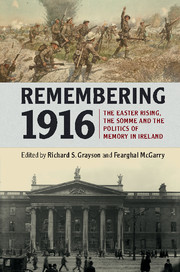Book contents
- Frontmatter
- Contents
- List of figures
- List of tables
- List of contributors
- Introduction
- Part I Memory and commemoration
- 1 Making sense of memory: coming to terms with conceptualisations of historical remembrance
- 2 Ritual, identity and nation: when the historian becomes the high priest of commemoration
- 3 ‘The Irish Republic was proclaimed by poster’: the politics of commemorating the Easter Rising
- Part II Narratives
- Part III Literary and material cultures
- Part IV Troubled memories
- Index
3 - ‘The Irish Republic was proclaimed by poster’: the politics of commemorating the Easter Rising
from Part I - Memory and commemoration
Published online by Cambridge University Press: 05 March 2016
- Frontmatter
- Contents
- List of figures
- List of tables
- List of contributors
- Introduction
- Part I Memory and commemoration
- 1 Making sense of memory: coming to terms with conceptualisations of historical remembrance
- 2 Ritual, identity and nation: when the historian becomes the high priest of commemoration
- 3 ‘The Irish Republic was proclaimed by poster’: the politics of commemorating the Easter Rising
- Part II Narratives
- Part III Literary and material cultures
- Part IV Troubled memories
- Index
Summary
In a city beset by rumours, the leaders of the Easter Rising quickly began to consolidate their message. On the second day of the insurrection, they issued War News, a four-page news sheet priced at a penny: ‘“War News” is published today because a momentous thing has happened … The Irish Republic was proclaimed by poster, which was prominently displayed in Dublin.’ War News also carried a report of the statement made by Patrick Pearse that morning which said:
The Irish Republic was proclaimed in Dublin on Easter Monday, 24th April, at 12 noon. Simultaneously with the issue of the proclamation of the Provisional Government the Dublin Division of the Army of the Republic, including the Irish Volunteers, Citizen Army, Hibernian Rifles, and other bodies, occupied dominating points in the city. The G.P.O was seized at 12 noon, the Castle was attacked at the same moment, and shortly afterwards the Four Courts were occupied.
Two things are striking about this account of the events of Easter Monday. Firstly, there is a very clear attempt to specify the exact moment of origin – to convey a sense of absolute alignment – and, secondly, there is no reference to the Proclamation having been read aloud. The Irish Republic was proclaimed not by Pearse but by poster. Therefore, even though a considerable amount of attention was being paid to how the Easter Rising should be recorded and remembered, the most powerful feature of its subsequent commemorative ritual was overlooked. The true significance of the Easter Rising would only be understood in retrospect and, indeed, its complex meaning in Irish society owed as much to how it was commemorated as to the original event.
Also on 25 April, James Stephens wrote: ‘On this day the rumours began, and I think it will be many a year before the rumours cease.’ Stephens's contemporaneous account of his experiences during Easter week is suffused with the impossibility of discovering anything truthful about the events unfolding in front of him. He met a man who ‘spat rumour as though his mouth were a machine gun or linotype machine’. This ‘wild individual’ believed everything he heard and transformed it ‘as by magic favourable to his hopes’. Stephens anticipated that the Rising would be an unknowable event and this facilitated the myth-making which permeated the ways it was narrated, remembered and commemorated.
- Type
- Chapter
- Information
- Remembering 1916The Easter Rising, the Somme and the Politics of Memory in Ireland, pp. 43 - 62Publisher: Cambridge University PressPrint publication year: 2016



